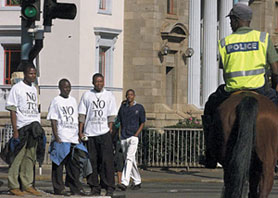
- FCN Editorial – First Mugabe, now Charles Taylor: Who’s next?
- Don’t blame Mugabe for everything SA Pres. Thabo Mbeki (UK Guardian)
- Activists: Fast track is right track in Zimbabwe land redistribution plan
- Journalists see Zimbabwe’s land crisis up close (FCN Special Report)
NEW YORK (FinalCall.com)–The December 12th Movement and a coalition of organizations are calling for a rally on June 28 at the Harlem State Office Building to demonstrate support for Zimbabwean President Robert Mugabe, the people of Zimbabwe and their land reform program.
“The land reform issue is central to the global struggle, now being waged in places such as Zimbabwe, North Korea and South America, to resist the stealing of resources by the so-called developed world,” said Omowale Clay, a December 12th spokesman.
December 12th has also been in the forefront in orchestrating the response to a June 3 letter sent to Pres. Mugabe that was authored by Bill Fletcher, president of the Washington-based TransAfrica Forum, and Salih Booker of Africa Action, also based in Washington. The letter asked Mr. Mugabe to “seek a peaceful and joint solution” to the political issues plaguing Zimbabwe.

In their letter, December 12th called on all Black Americans and supporters of justice to contact their elected officials and demand that they keep their “hands off Pres. Mugabe and the people of Zimbabwe.” The letter also stated unconditional support for Pres. Mugabe’s record of “revolutionary African land reclamation, redistribution and reform.” It continues with a call to oppose “regime change” in Zimbabwe and zero tolerance for any “dirty tricks” campaigns that may be waged against the country.
Over 60 organizations and individuals signed the December 12th Movement’s letter.
“We have had mixed reactions to our letter, a lot of it favorable, some of it negative,” Bill Fletcher told The Final Call during a telephone interview. He said much of the negative comments were absent of any historical examination on what has gone on in Zimbabwe.

“Pres. Mugabe has had 10 years to make his land reform work, and we are not against land redistribution, but not the way he (Pres. Mugabe) is doing it,” Mr. Fletcher said. “We are sticking to our position, in spite of criticism that I and the other signatories have taken up the call by the United States and the United Kingdom that Mr. Mugabe should be removed.”
Part of the Fletcher/Booker letter reads: “We do not need to recount here the details of the increasing, intolerant, repressive and violent policies of your government over the past three years, nor the devastating consequences of those policies. We believe that a peaceful solution is possible for Zimbabwe if you find a way to work with others inside and outside of your government to create an effective process for a transition to a more broadly supported government upholding the democratic rights of all.”
Some of the other signatories are former Ambassador Horace G. Dawson, director of the Ralph J. Bunche International Affairs Center at Howard University; Patricia Ann Ford, executive vice president of the Service Employees International Union; Julianne Malveaux, TransAfrica Forum board member; Rev. Justus Y. Reeves, executive director of the Mission Ministry of the Progressive National Baptist Convention; the Coordinating Committee of the Black Radical Congress; and William Lucy, president of the Coalition of Black Trade Unionists.
In a letter published in the Jan. 10 edition of the Zimbabwe Independent newspaper, Mr. Lucy issued a statement deploring what he described as Pres. Mugabe’s “intolerance” and relentless “assault” against trade unionists. He also accused Mr. Mugabe of “abandoning the liberation struggle principles for selfish ends.”

Professor James Small, the international vice president of the Organization of African American Unity, told The Final Call that there is a need to better inform Blacks in the Diaspora on exactly what took place at England’s Lancaster House in 1979, when the U.S. and UK agreed to pay for the land that had been stolen from Blacks in Zimbabwe.
“Pres. Mugabe and his government gave the Whites 12 years to come up with a plan of compensation, and nothing happened. They gave them another five years, and finally they took back what had been stolen from them,” Prof. Small stressed.
“There are too many Blacks in America pandering to right-wing elements,” Prof. Small said. “It is beyond my comprehension why any African American group would openly speak out against any African nation.”
On June 12, Mozambican President Joaquim Chissano, in an interview with the South African Broadcasting Corporation, said that punitive measures against the Zimbabwean government would merely worsen their crisis.
Pres. Chissano, who serves as the chairman of the Southern African Development Commission’s (SADC) defense and security committee, said that he and South African President Thabo Mbeki were using “quiet diplomacy” in their discussions with the Mugabe administration.
“The one thing we are conscious of is the need to respect the sovereignty of Zimbabwe,” Mr. Chissano said, adding that he thought that southern Africa had been through worse moments, and has been able to overcome them.












